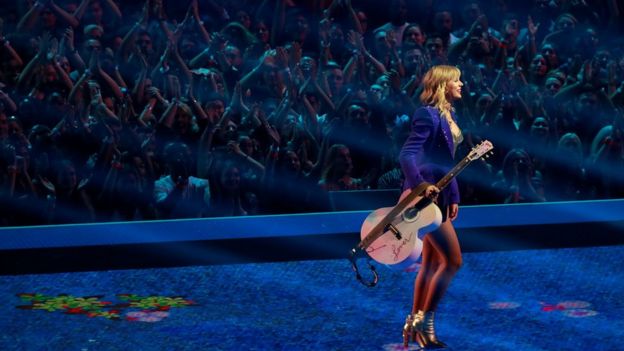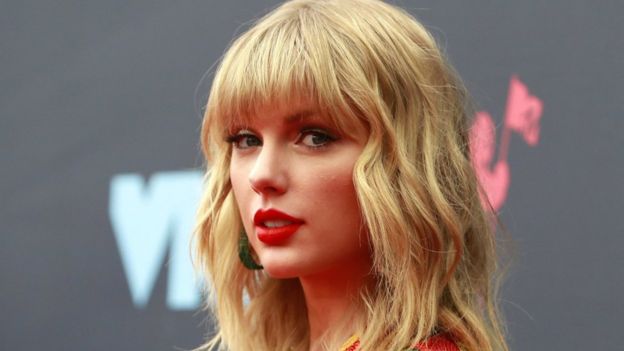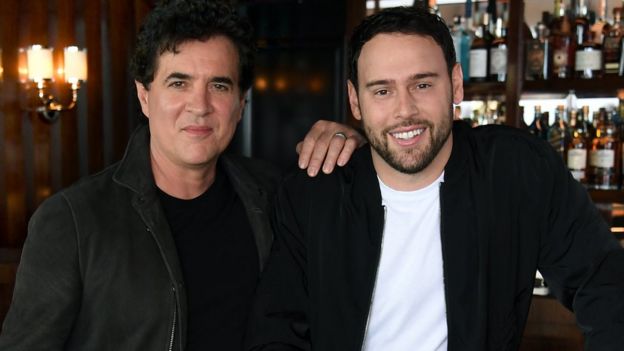

Taylor Swift’s former record label has rebuffed her claims it is blocking her from performing her own hits at the forthcoming American Music Awards.
The singer said music executives Scooter Braun and Scott Borchetta would not let her perform songs from her past albums, which they own the rights to.
She said a Netflix documentary about her life had also been put in jeopardy.
Borchetta and Braun’s Big Machine Records said Swift’s statement was “based on false information”.Swift made the allegations in a statement posted to Twitter with the caption: “Don’t know what else to do.”
“Right now my performance at the AMAs, the Netflix documentary and any other recorded events I am planning to play until November 2020 are a question mark,” she wrote.
But in response, the label denied telling the pop superstar she could not perform at the AMAs or trying to block the Netflix special, and said the “narrative you have created does not exist”.

In June, Swift revealed that the masters of her early music had been sold to Braun by her former record label, run by Borchetta, and alleged that she was not told about it.
At the time the singer accused Braun, who also manages Ariana Grande, Justin Bieber and Demi Lovato, of “incessant, manipulative bullying”.
Swift also accused Braun of attempting to “dismantle” her “musical legacy”. While he did not respond to her comments, he was supported by Lovato and Bieber, who claimed Swift was just out “to get sympathy”.
The singer confirmed in August that she planned to re-record music from her first six albums so she could own the rights to the new versions.
Swift is set to be named Artist of the Decade at the AMAs later this month and said she had been planning to perform a medley of her hits.
But in her statement on Thursday, she said the two men had blocked her from performing her old songs on television, claiming that this would be re-recording her music before she is allowed to next year.
They also blocked the use of her older music or performance footage in the upcoming Netflix film, she claimed.
Swift alleged that Borchetta told her team she would only be allowed to use the music if she agreed “not to re-record copycat versions” next year and stopped talking about the two men.

“The message being sent to me is very clear. Basically, be a good little girl and shut up. Or you’ll be punished,” she wrote.
She went on to ask her fans to help to pressure Braun and Borchetta into changing their minds and to appeal to the artists they manage for help. She also asked for help from the private equity firm The Carlyle Group, which she said financed the sale.
Fans responded instantly, with the hashtags “IStandWithTaylor” and “FreeTaylor” trending on Twitter.
In a statement, the Big Machine Label Group said it had been optimistic about resolving the long-running dispute – until Swift posted her statement on Thursday.
“Despite our persistent efforts to find a private and mutually satisfactory solution, Taylor made a unilateral decision last night to enlist her fanbase in a calculated manner that greatly affects the safety of our employees and their families,” the label said.
 Image copyrightGETTY IMAGES
Image copyrightGETTY IMAGES
“Taylor, the narrative you have created does not exist. All we ask is to have a direct and honest conversation. When that happens, you will see there is nothing but respect, kindness and support waiting for you on the other side.”
Big Machine also said: “At no point did we say Taylor could not perform on the AMAs or block her Netflix special. In fact, we do not have the right to keep her from performing live anywhere.”
It did not specifically address whether she could perform old songs.
In response, the singer’s publicist Tree Paine insisted that Borchetta “flatly denied the request for both American Music Awards and Netflix”. Both sides also claim the other owes them millions of dollars.
Borchetta founded Big Machine in 2005, and the company was bought by Braun’s Ithaca Holdings in June.
Stars including Halsey, Gigi Hadid and BBC Radio 1 DJ Greg James have leapt to the singer’s defence.
Fellow pop singer Halsey said: “These people are protected because they inspire complicity with fear.
“Banking on the illusion that people will not stand up for her. That the world will say she is over-reacting, You’re barking up the wrong tree.
“It is her grace and patience in these moments that make her artist of the decade,” she added.
Supermodel Hadid tweeted: “Scott and Scooter, you know what the right thing to do is.”
While the overwhelming majority of comments on social media were in Swift’s favour, some users accused the star of mobilising her fanbase to pressure the two executives and suggested fans should “take a second to look deeper” at the situation.
After Braun bought most of the US pop star’s life’s work, thanks to his acquisition of her former record label Big Machine for $300m (£237m) in June, Tim Ingham from Music Business Worldwide told the BBC in July that these kind of contract arrangements were fairly common in the days before music streaming.
“Unfortunately for Taylor Swift, she started recording at a time in the history of the industry when it was still heavily reliant on radio, where you needed a record company backing to get you on radio, particularly country radio in Nashville, where Big Machine was a huge player,” said Ingham.
“And also, you needed to rely on physical distribution to get your CDs into stores. So she needed a record company to invest the amount of money that they had to invest to get her career off the ground.”
Mark Sutherland, editor of trade publication Music Week, agreed in July with Ingham that Braun’s business decisions will most likely be driven by money.
“A lot of those songs are going to be a small goldmine in the streaming environment as they are enduring pop hits that are going to be streamed from now until the next 20, 30, 40 years.” – bbc.com